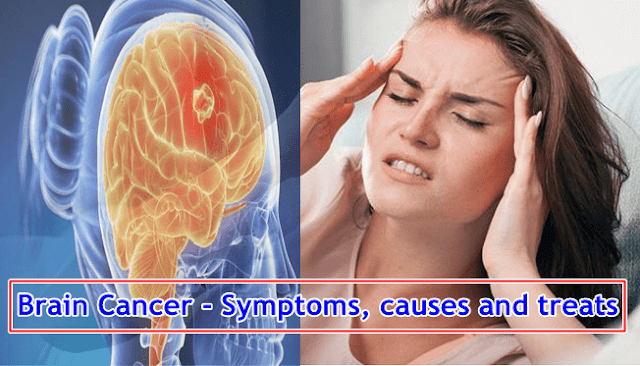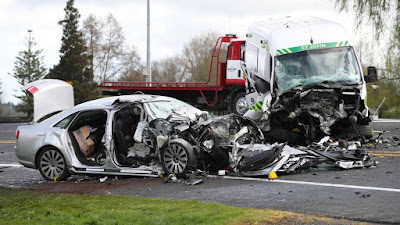Brain Cancer - Symptoms, causes and treats
Brain cancer could be a malignant tumor which will unfold chop-chop to different elements of the brain and spine. Please note not all brain tumors are malignant and can be categorized as cancer. There is also a benign brain tumor. A benign brain tumor is a group of brain cells that grow slowly and do not spread to other parts.
Brain tumor itself is the growth of brain cells that are unnatural and uncontrollable. In the brain, the tumor can develop from the cells that make up the brain tissue, from the nerves going in and out of the brain, and from the protective membranes of the brain and the spinal cord (meanings).
According to the origin, brain tumors are divided into two, namely primary and secondary. The primary brain tumor is a tumor that appears in the brain, whereas secondary brain tumors are tumors that originate from other body parts but spread to the brain.

Most cases of brain cancer are a type of secondary brain cancer, where cancer begins with other organs and then spreads to the brain. When viewed from the level of development and the rate of growth and spread, brain tumor malignancy is divided into 4 levels:
Brain tumors do not know the age and can infect anyone, including children. According to WHO data, in 2012 there were about 4900 cases of brain cancer that occurred in Indonesia. When viewed from the sex, the brains of men's brain cancer a little more than women.
Genetic diseases such as neurofibromatosis (a genetic disease that causes tumors to grow in the nerves) may increase the risk of developing brain tumors. However, the main cause of most brain tumors is unknown.
Symptoms of a tumor vary from one patient to a different betting on the scale and a part of the affected brain. Tumors will create the world of the affected brain not perform properly and suppress the brain tissue inflicting headaches and convulsions.
Here are some common symptoms of another brain tumor:
Primary brain cancer has three factors that can affect treatment outcomes:
The disease should be treated as quickly as possible, usually with surgical action to remove as many cancer cells as possible. The healing process can be continued with radiotherapy, chemotherapy, or a combination of both. If surgery is not done immediately, cancer can potentially spread and damage parts of the brain and spinal cord, even to other organs.
While in secondary brain cancer, treatment edges solely to alleviate symptoms and prolong life solely. As a result of the tiny chance for patients to recover utterly, particularly tumors and cancer that has unfolded to alternative body components.
Feeling worried may be a natural factor for folks with brain cancer. The entire family of sufferers ought to be concerned all told decision-making and the way to measure standard of living. Families should also understand and understand what is and is likely to happen.
Here are some things that might help you, your family, and your close friends to cope with the changes in life:
Brain cancer can have an impact on motor skills, speech, vision, and mindset during and after treatment. There are various types of therapy can be done to help the recovery process. You can undergo counseling if you want to discuss the emotional aspects of your diagnosis and treatment.
Brain tumor itself is the growth of brain cells that are unnatural and uncontrollable. In the brain, the tumor can develop from the cells that make up the brain tissue, from the nerves going in and out of the brain, and from the protective membranes of the brain and the spinal cord (meanings).
According to the origin, brain tumors are divided into two, namely primary and secondary. The primary brain tumor is a tumor that appears in the brain, whereas secondary brain tumors are tumors that originate from other body parts but spread to the brain.

Most cases of brain cancer are a type of secondary brain cancer, where cancer begins with other organs and then spreads to the brain. When viewed from the level of development and the rate of growth and spread, brain tumor malignancy is divided into 4 levels:
- Stage 1 and 2: it's generally benign.
- Stage 3 and 4: usually are malignant, and can be referred to as 'cancer'.
Brain tumors do not know the age and can infect anyone, including children. According to WHO data, in 2012 there were about 4900 cases of brain cancer that occurred in Indonesia. When viewed from the sex, the brains of men's brain cancer a little more than women.
Genetic diseases such as neurofibromatosis (a genetic disease that causes tumors to grow in the nerves) may increase the risk of developing brain tumors. However, the main cause of most brain tumors is unknown.
Symptoms of Brain Cancer
Symptoms of a tumor vary from one patient to a different betting on the scale and a part of the affected brain. Tumors will create the world of the affected brain not perform properly and suppress the brain tissue inflicting headaches and convulsions.
Here are some common symptoms of another brain tumor:
- Excessive fatigue and easy drowsiness.
- Impaired vision.
- Disorder walking and talking.
- Throws up.
Read More: Symptoms and Characteristics of Brain Cancer
Brain Cancer Treatment
Primary brain cancer has three factors that can affect treatment outcomes:
- The type of brain cell that becomes a tumor.
- The location of the tumor in the brain.
- The health condition and age of the patient when diagnosed with a tumor.
The disease should be treated as quickly as possible, usually with surgical action to remove as many cancer cells as possible. The healing process can be continued with radiotherapy, chemotherapy, or a combination of both. If surgery is not done immediately, cancer can potentially spread and damage parts of the brain and spinal cord, even to other organs.
While in secondary brain cancer, treatment edges solely to alleviate symptoms and prolong life solely. As a result of the tiny chance for patients to recover utterly, particularly tumors and cancer that has unfolded to alternative body components.
For Brain Cancer Patients
Feeling worried may be a natural factor for folks with brain cancer. The entire family of sufferers ought to be concerned all told decision-making and the way to measure standard of living. Families should also understand and understand what is and is likely to happen.
Here are some things that might help you, your family, and your close friends to cope with the changes in life:
- Seeking accurate medical information about the disease and choice of the brain cancer treatment process.
- If you find it difficult to remember questions and answers, write them down as a reminder. Prepare something to take notes.
- It is good for you to make decisions actively in your choice of treatment and care. This can help eliminate the fear of incomprehension and you may feel you have control over what happens.
- Do not force yourself to maneuver on because it was before you were diagnosed. Set a limit for yourself.
Read Also : Mesothelioma Attorney In California




